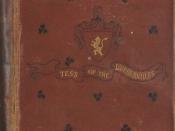The two novels in question, "Dear Nobody" and "Tess of the D'urbervilles" (hereafter referred to as "Tess"), raise surprisingly similar issues for books written in such different times and among such varying attitudes. However, the period difference does highlight some major contrasts, most relevantly, the censorship that would have taken place, had Hardy alluded to any details concerning sex or seduction. In both books, the situations and moral messages reflect the author's opinions and ideas on ethical subjects such as premarital sex, pregnancy, single motherhood, and above all, the trials and tribulations of love.
Obviously, the two heroines, Tess Durbeyfield and Helen Garton, were born into very diverse circumstances: Helen came from modern day family, with every opportunity to do whatever she wants to in life available to her. Tess, by contrast, was brought up in a poor, country family from the 1890's. This simple but vital contrast, is highlighted, perhaps inadvertently, by Hardy's colloquial use of old, country dialect in the characters' speech, such as, during Tess' conversation with her brother Abraham, "Bain't you glad that we've become gentlefolk, Tess?" "Not particular glad", and in Mrs.
Durbeyfield's proud announcement to her husband, "I've got miself a projick".
For Tess, there was nowhere really for her to go. She couldn't have had a career to speak of, only to become a farmer's wife, nor could she have moved away from her village and family without a husband, as that would have been seen as inappropriate. It would have been presumed that Tess' life would have become very much like her mother's: she would have married, become a mother, and lived as a housewife.
However, neither of the girls fulfilled the fate that was expected of them for the same reason: they both partake in pre-marital sex leading to the conception of a child. So, for Tess, as her future depended mainly on finding a good and loving husband, Alec's actions towards her effectively ruined Tess' life. The circumstances in which the sex evolved, however, could not have been more different, and the authors use different descriptive techniques accordingly.





